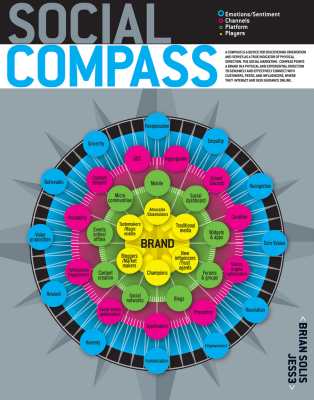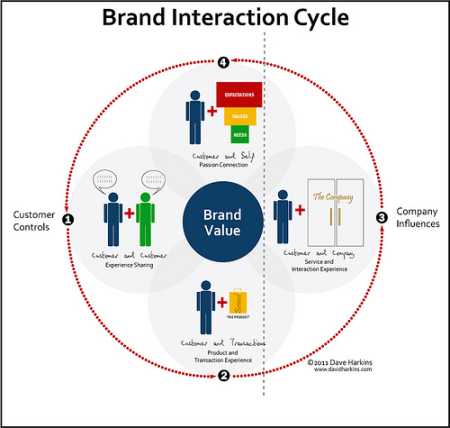As branding has worked its way into startup lexicon, it seems prudent to take a look at the process as a whole. During Everywhere Else Cincinnati, there were many presentations in which branding was either the main or secondary focus; all of which served as the inspiration for this post.

Image Via Brian Solis on Flickr
Featured Image Via Dave Harkins on Flickr
Branding was the main topic of the memorable talks by Patrick Woods – The Director of Business Development for a>m Ventures, Jake Stutzman – Creative Director for Elevate.1 However, branding played a role in the talks by Dave Knox – Co-Founder of The Brandery, John Bracken – CEO of Speek, Derek Flanzraich – CEO of Greatist, among others.2 The content of the sessions has already been discussed in detail, but it seems pertinent to take a step back and look at the totality of all that was said.3 A few of Jake Sutzman’s 8 “Mandates for Meaning” will guide this look at branding.
Know Yourself
Knowing yourself is the beginning of all wisdom.
? Aristotle
This is one of the most crucial aspects of branding. In-fact, this sentiment was brought up in every session that had anything whatsoever to do with branding. Before even thinking about messaging or a logo, it is vital to undertake introspection on a company-wide scale – though at this point in the life-cycle of a company, it is most likely just a small team.
Much of Woods’ talk spoke to this point as well. Too often, Woods said, either by choice or coincidence, startups sound like startups; they really lack a personality beyond their product.4 Personality is key. Crafting a personality for your brand is more than simply spewing out product details or various metrics. In his discussion, Flanzraich argued that startups need to establish a consistent tone of voice, which starts with the audience.
Know Your Audience 5
To know yourself, you have to take a good hard look at your audience/customer – or prospective audience/customers. What do they do? Where do they hang out? What do they buy? What do they read? Understanding what your audience gravitates towards is instrumental in crafting a meaningful, relevant brand.
Create and Cast a Consistent Vision
“Cast a Vision” may sound dramatic. It does not necessarily mean to spell out some new world view, but rather to spell out the vision of your product and brand: how it will help people; how it will add value; how it serves a purpose. Once the vision has been established, cast it outward.
Consistent is not to say that you can’t refine and tweak your message, you should, just that the top-level things (mission, core values, overall tone of voice) should be uniform. As Stutzman argued, “Be a broken record.” Once the top level vision has been installed, repeat it often and loudly. Your core message and values should be so prevalent that it is instantly associated with your logo or other marketing materials.
Be Accessible and Empower Brand Champions
Once your vision has been established and cast outwards, listen to what comes back. If people have questions or concerns, address them. This is more than simply customer service – though good customer service is a major plus.6 It is about being human, if you will pardon a cliche. If you are putting a valuable message out there, and people gravitate towards it, let them speak; empower them to speak with you.7 Give your champions tools spread your vision, and recognition when the do so. 8
The whole is greater than the sum of its parts.
? Aristotle
Branding is much wider than a logo and color scheme. It is the entire ecosystem of touch-points a business has with the outside world. It is important to note that you – as a company – can only control one side of the branding equation. You control what you send out into the world, but you can not control how it makes people feel. Perhaps the best quote from Everywhere Else Cincinnati on branding came from Derek Flanzraich: “Don’t Suck!”
Here are some interesting articles and guides I came across while writing this piece 9
-
@daveknox – The Brandery
@johnbracken – Speek
@thederek – Greatist ▲ - Our friends over at Nibletz, who put on Everywhere Else Cincinnati, wrote some really good articles about some of the talks: “A Startup Walks Into A Bar And Orders…” (A really good read about soap, beer, and pizza) on Patrick Woods’ talk, and “8 Mandates To Finding Your Meaning From Elevate’s Jake Stutzman At Everywhere Else Cincinnati” really stand out. ▲
- Andy Brownfield, “What can soap teach startups about branding?” Cincinnati Business Enquirer. ▲
- “Know Yourself” and “Know Your Audience” are connected. You cant know yourself without knowing your audience and vice versa. Think of them as two separate processes in the same step. ▲
- Look at this Tweet from Jared Steffes ▲
- Rohan Jain wrote an excellent answer on Quora to the question, “Product Evangelism: How do you convert your users into evangelists?” Although Jain goes into some details beyond branding, necessarily to answer the question, he raises some great points about empowering brand champions. ▲
- Rewarding and recognizing brand champions can come in many different forms. It can be a simple as a t-shirt – like Quora gives out to the top writers – or a loyalty discount, or free upgrade, or stickers. ▲
- “Brands And Beliefs” by Mark Di Somma in Branding Strategy Insider
“If You Love Your Brand, Set it Free” by Jose Martinez Salmeron in Smashing Magazine
“To which brands are you loyal, and why?” on Quora, 45 Answers.
“A Working Definition of Brand” by Jeremiah Gardner in Branding Magazine ▲

